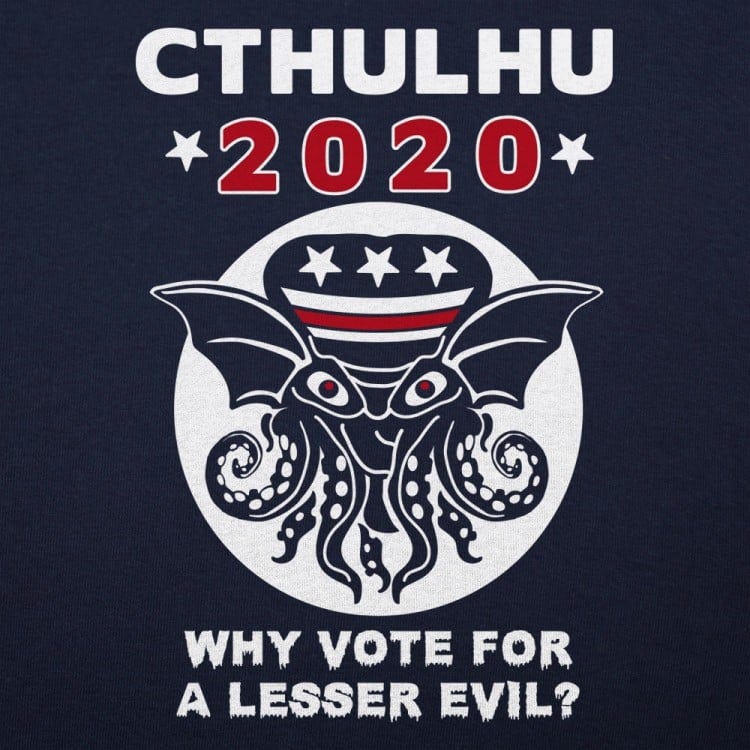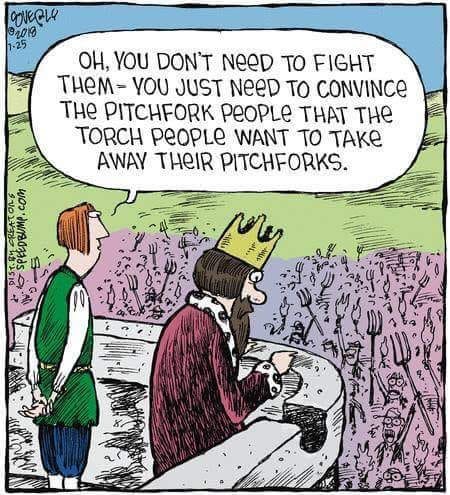Divide and Rule
A way of keeping power by creating disagreements and factions
Prevent Public from Making Common Cause
Most people have heard the terms “Divide and Rule” or “Divide & Conquer.”
The British used this technique to build and maintain their empire and even now you’ll see it still pervasive today, once you understand it fully.
a way of keeping yourself in a position of power by causing disagreements among other people so they are unable to oppose you.
the policy of not allowing subject peoples or factions to make common cause
1) Tactics:
Here are 3 tactics that can be employed:
a) Granting special benefit or blame to some, which leads to divisions.
Fund military contractor jobs in many congressional districts with the implicit threat of losing the jobs if the military projects don’t continue to receive funding.1
Corporations (like Amazon) buy off opposition by getting governments to compete for corporate jobs and tax revenue. The cooperating state or local governments get rewarded with a disproportionate amount of the revenue, while the losing governments get less or nothing. The British did this in India by setting the Muslims and Hindis against each other.
Scapegoating: the act of blaming a person or group for something bad that has happened or that someone else has done. (Often the scapegoat is in a minority position.)
b) Limiting Choice:
Those in power may prevent people from exercising choice by giving only 1 option or instructing people that they must choose the lesser evil.
In an environment where people feel they lack control, they may develop “Learned Helplessness” — giving up because they believe they lack the ability to achieve a goal — “There is nothing I can do" mentality.
c) Causing disagreements among people so that they are unable to oppose you.
One way of dividing people is to use a wedge issue - often a controversial or divisive nature, which splits apart a demographic or population group. Wedge issues can be advertised or publicly aired in an attempt to strengthen the unity of a population, with the goal of enticing polarized individuals to give support to an opponent or to withdraw their support entirely out of disillusionment. The use of wedge issues gives rise to wedge politics. Wedge issues are also known as hot-button or third-rail issues.
2) History:
The “Divide and Rule” strategy is commonly used by corporate psychopaths and was used by
3) Academic Research:
Alder, Simon and Wang, Yikai, Divide and Rule: How Political Elites Polarize Society (June 13, 2022). Available at SSRN: https://ssrn.com/abstract=3769435 or http://dx.doi.org/10.2139/ssrn.3769435
Posner, Eric A., Spier, Kathryn E., and Vermuele, Adrian. Divide and Conquer.
YouTube Comment:
Divide and conquer works because not everyone involved knows that they are taking on a role in a power game. That's how the strategy works. Very few people really need to understand it. In English, the principle is called "Useful Innocent/Useful Idiot." From a position of power, you can animate people (usually through money, or ideology) who play a role, but they know not what they do.
The peoples of Eurasia and the world, including Western Europe (most of which are Christian) and Western Asia (most of which are Semites), have been divided and ruled by foreigners for centuries.
Because it's easier to divide people based on personal differences than to unite them based on their similarities. Strategically ambivalent foreigners use this to their own advantage. In the era of European imperialism, London initially dragged along its junior partner Paris to meddle here, and after 1945 as the influence of European colonial powers declined, Washington DC simply took on the role of divider (during the Cold War, the whole world was the playground). Now the intention is simply to avoid the unity of Eurasia in order to "rule" over the dissenters, which is the classic "divide and conquer" principle. This strategy is kept under wraps, due to a systemic desire to be "good", and on the "right side of history", and therefore overemphasizing the actions of philanthropists, political doves, peace activists, religious leaders, etc.
At the same time the activities of political hawks sowing divisions are downplayed, relativized, apologized for, mostly by politicians and strategists as the "story tellers" of history. But also by commoners, who simply parrot the stories without thinking them through, and who are NOT privy to the overall strategy (divide-and-rule in all its intricacies and nuances).
"The main interest of the United States - for which we have been fighting wars for a century (the First, Second and the Cold War) - has been the relationship between Germany and Russia. Because united they are the only power that could threaten us. And we must make sure that does not happen. ... For the United States ... the greatest fear is German technology, German capital and Russian natural resources, Russian labor as the only combination that has frightened the United States for centuries. So how does this play out? Well, the US has already put its cards on the table. It is the line from the Baltic to the Black Sea." - George Friedman, Stratfor, February 2015
Today their leaders are too weak to unite, to avoid their "friends" simply drawing lines on the map, which they cower down to and must obey.
Like a ratchet, one click at a time, the "marching empire."
Endless wars, constant disagreements, using imperialism to stay on top.
Using "levers" of lies and distrust, via power players.
Creating favorites: favoring the proxies who bow down and sacrifice themselves for the mastah.
Pointing fingers, everywhere else, using the POWER of the mainstream media.
Divide-and-rule/conquer.
The oldest trick in the book...
Who has the POWER? Who (in all historical cases in Eurasia) had the GEOGRAPHICAL ADVANTAGE of being able to reach all other "buck catchers" (tools and other instruments of POWER in the Roman era style), but could not be reached themselves at any point in a historical timeline due to a geographical-, technological-, organizational-, military-, strategic- or political advantage?
“Divide-and-rule/conquer” as a standard strategy of power and thus the cause of nearly all conflicts in the world connects the dots on the timeline of history. Who (in all historical cases in the Middle East/Levant) had the GEOGRAPHICAL ADVANTAGE of being far from the events resulting from their own meddling and political activities and being able to reach all other regions, but could not be reached themselves as a hegemony at any point in a historical timeline? It only works within a technological window of opportunity: for the British Empire, it was when naval power “ruled the world” and its own heartland was “unreachable” and from this impregnable fortress it could “divide” all others and thus prevent unification elsewhere. After WWII and today, it will only work as long as the combination of political influence, nuclear weapons and cultural hegemony dominates all others.
Pax Romana. Pax Britannica. Pax Americana. All they want is peace, they say. Who gathers the pieces of the great wealth and systemic gains when everyone else has failed to unite?
Different empires. Different era. Same games...
Once the Albion, always the Albion.
In their own narratives, the "empire" and "divider" is ALWAYS the "good guy."
The opposition that wants unity in a region is the "bad guy."
We, who seek true peace and harmony, are not outnumbered. We are out-organized.
PIC: Political Industrial Complex
FIC: Financial Industrial Complex
NIC: Narrative Industrial Complex
MIC: Military Industrial Complex
CIP: Cultural Industrial Complex
Forget "3D chess." Everything you know is a "variation" of reality. They are playing “5D chess” with the minds of 2D checkers players, within the rains of people who think they are “smart”.
Senator Bernie Sanders might as well accept funding for F-35s in his own state because otherwise some other district will get the benefit. This is a classic game-theory “prisoner's dilemma.” Unless a politician is able to persuade other politicians not to accept the contractor basing jobs in their district, they will “lose” by opposing the program on principle.




